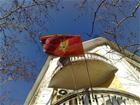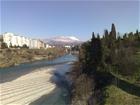Montenegro in Anticipation of Surprises from the December EU Summit
Evelina Topalova, November 29, 2011
 The euphoria that was reigning in Montenegro, following the European Commission October progress report, and the recommendation for a start of EU accession talks has started to transform into anxiety. The Balkan country's enthusiasm was first watered down by Dutch lawmakers and later on by France, which said explicitly that the issue should be left for mid-2012. Montenegrin leaders are still confident that the recommendation would be approved and keep on lobbying to obtain a date for the start of the negotiations.
The euphoria that was reigning in Montenegro, following the European Commission October progress report, and the recommendation for a start of EU accession talks has started to transform into anxiety. The Balkan country's enthusiasm was first watered down by Dutch lawmakers and later on by France, which said explicitly that the issue should be left for mid-2012. Montenegrin leaders are still confident that the recommendation would be approved and keep on lobbying to obtain a date for the start of the negotiations.
The confusion was triggered on November 22 by reports in some media that, according to preliminary conclusions of the Dutch parliamentary committee on European Affairs, Montenegro should not be allowed to start accession talks because the country had failed to prove efficient in the fight against corruption and in the rule of law area. The alleged conclusions were denied and replaced with information that the panel had actually asked the government to give more details about its stance and no final decision had been made yet but, anyway, the doubts came to confirm that Dutch reserves indeed exist.
And while media were wondering whether the Netherlands would block Montenegro's EU bid or not, Prime Minister Igor Luksic voiced optimism that his country would start talks with the bloc yet next year. He admitted that a lot of work needed to be done but stressed the importance for EU leaders to confirm the recommendation in order to keep reform momentum.
Meanwhile, an unexpected blow for Montenegro came from France. Montenegrin media have quoted government spokesperson Valerie Pecresse as saying that it would be premature to launch accession talks in December and would be better to delay the discussion until mid-2012, when the country would have to prove that it had achieved visible results in the rule of law area.
Against the background of all these statements and hints about possible stances regarding Montenegro's application, it is not clear what would be the outcome of the December 9 EU summit. Germany is known to be in favour of the start of accession talks and its voice is strong enough. One should not forget, though, that the Netherlands has already blocked Serbia's EU bid. Belgrade was able to make progress in its EU integration process only after it arrested former military leader of the Bosnian Serbs Ratko Mladic, which was the Hague authorities' main condition to lift their objections to Serbia's further EU integration.
All the 27 EU member states need to give their consent so that Montenegro could receive a green light to start the talks. If the Commission recommendation is not approved in December, the country will end up in the position of Macedonia, which has obtained a candidate status and a recommendation to start the negotiations but not a date. The Macedonian case, however, is a bit different because it depends on finding a solution to a regional dispute with Greece.
Podgorica does not experience problems with its relations with its  neighbours but faces difficulties in the fight against corruption and organised crime.
neighbours but faces difficulties in the fight against corruption and organised crime.
In November 2010, when approving the candidate status, the European Commission highlighted seven key priorities that needed progress should Montenegro's application was to be forwarded at the next stage. They included improvement of the legislative framework for elections in line with the recommendations of the OSCE and the Venice Commission, reforms in the public administration, strengthening the rule of law and guarantees for independent judiciary, measures to tackle corruption, boosting fight against organised crime, enhancement of media freedom and implementation of the policy framework on anti-discrimination against minorities in line with European and international standards.
A year later - in October 2011 - the European Commission recommended the EU to launch accession talks with Montenegro, estimating that Podgorica has achieved "overall satisfactory results" and progress on the seven priority areas. Reforms needed to continue, in particular in view of consolidating the track record in combating corruption and organised crime and ensuring full implementation of the anti-discrimination legislation, the Commission reminded.
Whether the European leaders will take into consideration this recommendation will become clear on December 9, and until then Montenegrin leaders will keep on lobbying to secure a positive outcome of the summit for Montenegro.
 Bakir Izetbegovic, Andrej Plenkovic | © Council of the EU
Bakir Izetbegovic, Andrej Plenkovic | © Council of the EU Aleksandar Vucic, Recep Tayyip Erdogan | © Serbian Presidency
Aleksandar Vucic, Recep Tayyip Erdogan | © Serbian Presidency Jean-Claude Juncker, Zoran Zaev | © European Commission
Jean-Claude Juncker, Zoran Zaev | © European Commission